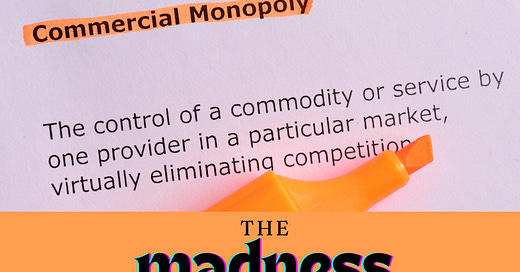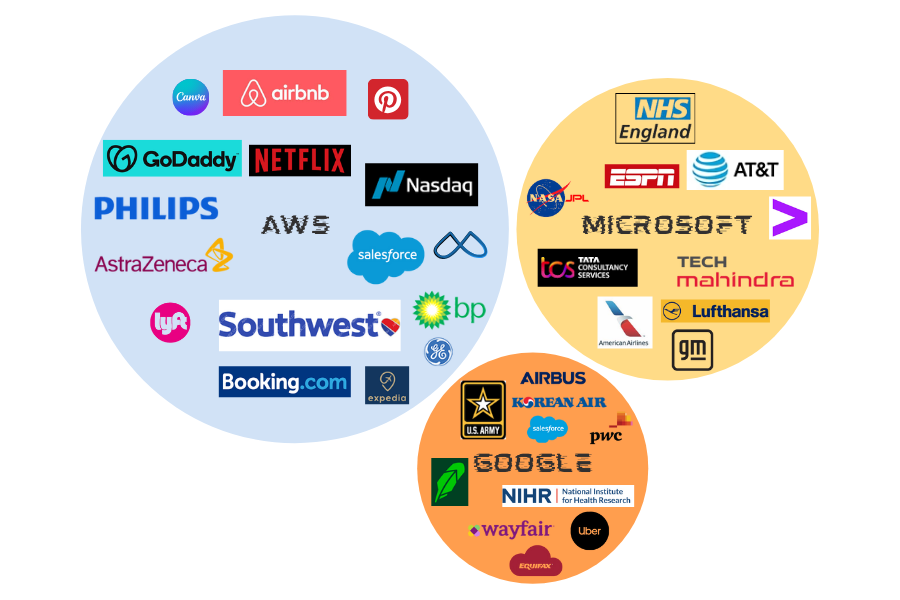The Madness of Monopolies
How Big Tech's monopolies have spread their tentacles to control every aspect of our lives.
When Elon Musk took over Twitter in late 2022 he was frustrated to find that he had to pay Apple a 30% cut to enable in-app purchases. He railed against the injustice of Apple’s fee structure, its knowledge of Twitter’s (porn-related) skeletons, its monopolistic tendencies and the fact that there was no good alternative.
Even a billionaire had to bow down to Apple’s policies in order to use its App Store. Even a billionaire who himself steadfastly controls much of the electric vehicle and charging infrastructure in the country had to fork over the required tithe to Apple.
Even he understood that Apple has way too much power over our lives.
Last month, we saw how one small bug in Microsoft’s systems led to world wide outage. Hundreds of flights ground to a halt, thousands of businesses had to freeze their operations, and millions of regular users were left blinking at blue screens.
This one incident stripped off the curtains and showed us how much our lives and livelihoods depend on Big Tech.
The last few decades of tech worship has led to much hubris in Silicon Valley. We are used to things move along quite smoothly so when an incident like this occurs, the world is left in the lurch while the company hastily shrugs off responsibility.
But failures like these have been years in the making. Nature has taught us that there is strength in diversity and that monocultures are a recipe for disaster. A single bug, a single water-borne virus, just one plague of locusts, or a bad fire season is enough to wipe out an entire single-specied forest.
And so it is with the artificial environments we live in.
Around the world schools, colleges, and universities use Microsoft’s OS. Small entrepreneurs use the MS Suite to run their companies. Bigger Businesses involving flights, hotels, and hospitals employ Azure, MS Suite, MS Enterprise Solutions to run their national and inter-national level operations.
When one small bug can wipe out much of the world’s working it is cause for concern.
Yesterday it was Microsoft, tomorrow it could be Apple, Google, Meta or Nvidia.
What then?
If Google fails, then again businesses, educational institutions, and everyday users, will ground to a halt. If Apple were to fail, basic communication itself could face an issue. Same with companies like AT&T, Verizon, Airtel and Jio.
Emergency services will be affected, and we will not be able to reach even 911 on time. As was the case when At&T recently experienced a multi-state wide blackout.
Our reliance on tech, its clouds, data centers, and its software solutions means that we have moved away from reliable local ones. Our increased social isolation means that we are hesitant and scared to reach out to neighbors for help. Crises after crises has shown why this is a problem and why monopolies may even dictate the difference between life and death.
The good news is that people are fighting back.
The long list of lawsuits against Tech is attempting to chip at the tech barons and bring them down to earth. Increased regulation and oversight has been proposed by politicians on both sides of the spectrum. However, tech billionaires are not happy with these attempts. Recently, LinkedIn’s Reid Hoffman has said that he will support Kamala Harris only if she stops the lawsuits and fires FTC’s Lina Khan.
Elon Musk has openly embraced Trump and Project 2025’s deregulation and anti-tax mantra. Peter Thiel is actively supplying weapons to invading states and waging war on anyone who speaks up against him. Mark Zuckerberg has celebrated Trump’s vigor and seen cozying up to India’s emperor, Ambani. The tech billionaires are blatantly moving to the right and actively seeking further deregulation.
This right-veering ruling class bodes ill for consumers and the society. Increased wealth accumulation, power, and control over our lives lies in the hands of a few. And if there is ever a situation when one falls down, the others will be quick to come down too, sending shock waves over the entire world.
And unfortunately, Big Tech and the Magnificent 7 even control the stock market and thereby the retirement savings for much of the world.
Tech is so entrenched in our lives that anything that happens online is going to affect us offline as well.
Now is the time to change the narrative. While touting innovation, tech barons have actively stifled creativity and competition. Diversifying tech, breaking down these monopolies, pursuing regulation, and increasing support for new entrepreneurs and small businesses can help brunt the damage and improve our lives.
Perhaps something to keep in mind this election cycle.
Note: Thanks for reading this article! This article explored a question I had in my mind for a while and I hope it sheds some light for you too.
I have decided to add in the option to get substituted for my Substack. I devote considerable amount of time in researching and writing this newsletter and I am thrilled and grateful for the the support I have received so far. I hope to continue shedding light on the tech industry and I would love it if you are willing to become a patron and support my work. My posts will continue being available to all. I am hoping that those who can afford to patronize me can help subsidize those who cannot.
PS: Substack forces me to choose higher rates that may be out of reach for my Indian readers. Instead, I give you my paypal link, so feel to contribute an amount that pleases you! (Let’s see how long Substack allows this.)






A sobering reading for much of the tech-relying society!